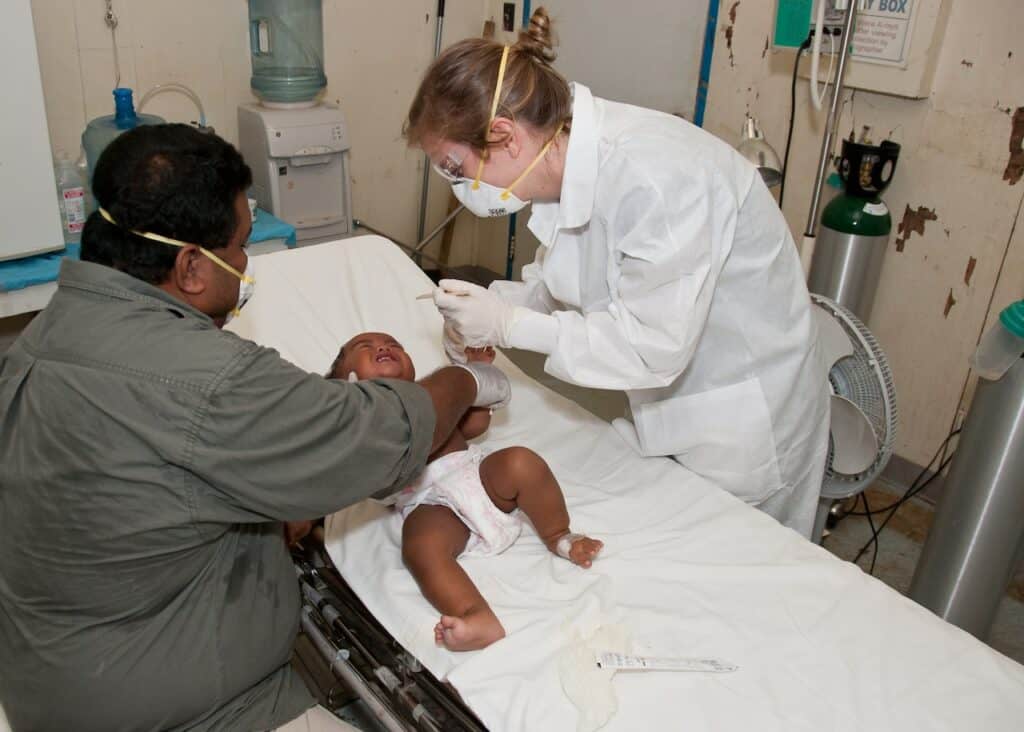Excessive mucus production in babies can lead to choking, especially during sleep. This can be a terrifying experience for both the baby and the caregiver. Understanding the causes and symptoms of baby choking on mucus at night can help prevent and manage this situation.
Mucus is a protective substance that lines the respiratory tract, trapping harmful particles and preventing infections. However, excessive mucus production can occur due to various reasons such as allergies, infections, or irritants. When this mucus accumulates in the airways, it can obstruct breathing and cause choking, especially at night when the baby is lying down.
Recognizing the symptoms of baby choking on mucus at night is crucial for immediate response and prevention. Symptoms may include coughing, gagging, wheezing, difficulty breathing, and cyanosis (blue discoloration of the skin). Caregivers should be prepared to respond quickly and effectively to prevent further complications.
Understanding Baby Choking on Mucus at Night
Choking on mucus can be a scary experience for both parents and babies. It can happen during the day or at night, but nighttime choking can be particularly distressing for parents as they may not notice it right away. Here are some things to know about baby choking on mucus at night.

What Causes Baby Choking on Mucus at Night?
Mucus is a natural substance that helps to protect the respiratory system from irritants and infections. However, when too much mucus is produced, it can cause choking and coughing. Babies are more susceptible to choking on mucus because their airways are smaller and more sensitive than adults. The following factors can contribute to excessive mucus production in babies:
- Cold or flu: Viral infections can cause the body to produce more mucus than usual.
- Allergies: Allergic reactions to environmental factors like dust, pollen, or pet dander can cause mucus production.
- Reflux: Gastroesophageal reflux disease (GERD) can cause stomach acid to flow back into the esophagus, leading to mucus production.
- Teething: Teething can cause excessive drooling, which can lead to mucus production.
Symptoms of Baby Choking on Mucus at Night
The following symptoms may indicate that a baby is choking on mucus at night:
- Coughing or gagging
- Wheezing or whistling sounds while breathing
- Rapid breathing or shortness of breath
- Difficulty swallowing
- Blue or pale skin
- Loss of consciousness
What to Do If a Baby Chokes on Mucus at Night

If a baby is choking on mucus at night, it’s important to act quickly to prevent further complications. Here are some steps to take:
- Stay calm and try to keep the baby calm.
- Sit the baby upright and pat their back gently to help them clear the mucus.
- Use a humidifier or vaporizer to help loosen the mucus.
- If the baby is having difficulty breathing, call 911 or go to the emergency room immediately.
In summary, baby choking on mucus at night can be caused by various factors, and it’s important to recognize the symptoms and take appropriate action to prevent complications.
Causes of Excessive Mucus Production
Excessive mucus production in babies can be caused by a variety of factors, including common illnesses, allergies and asthma, reflux, and teething. Understanding the causes of excessive mucus production can help parents take steps to prevent choking and other complications.
Common Illnesses
Many common illnesses can cause excessive mucus production in babies. These illnesses include:
- Flu
- Colds
- COVID-19
- Respiratory syncytial virus (RSV)
- Sinus infection
When a baby is sick, their body produces more mucus to help fight off the infection. This excess mucus can cause choking and other complications, especially at night when the baby is lying down.
Allergies and Asthma
Allergies and asthma can also cause excessive mucus production in babies. When a baby is exposed to allergens or triggers such as pollen, dust, or pet dander, their body may produce more mucus than usual. This excess mucus can make it difficult for the baby to breathe and can cause choking.
Babies with asthma may also produce more mucus than usual, especially during an asthma attack. This excess mucus can make it difficult for the baby to breathe and can cause choking and other complications.
Reflux and Teething

Reflux and teething can also cause excessive mucus production in babies. When a baby has reflux, stomach acid can enter the esophagus and irritate the lining, causing the body to produce more mucus. Teething can also cause excessive drooling, which can lead to increased mucus production.
Parents can take steps to reduce excessive mucus production in babies by addressing the underlying causes. For example, if a baby has allergies, parents can take steps to reduce exposure to allergens. If a baby has reflux, parents can try feeding the baby smaller, more frequent meals and keeping the baby upright after feeding. If a baby is teething, parents can provide teething toys to help soothe the baby’s gums and reduce drooling.
Recognizing the Symptoms

When a baby chokes on mucus at night, it can be a frightening experience for both the baby and the parents. However, recognizing the symptoms can help parents take action quickly and prevent the situation from becoming more serious.
One of the most common symptoms of a baby choking on mucus is coughing. The cough may sound wet or phlegmy, and may be accompanied by wheezing or gasping for breath. If the coughing is severe or prolonged, it may be a sign that the baby’s airway is partially blocked by mucus.
Another symptom to watch for is difficulty breathing. The baby may seem to be struggling to take in air, and may make a high-pitched noise when breathing in or out. In some cases, the baby may start to turn blue or pale, which is a sign of respiratory distress and requires immediate medical attention.
Other symptoms of a baby choking on mucus may include fever, gagging, sneezing, or croup. A runny nose or coughing spell may also be present, especially if the baby has a cold or other respiratory infection.
If a parent suspects that their baby is choking on mucus, it is important to act quickly. They should try to clear the mucus from the baby’s airway by gently patting their back or using a bulb syringe to suction out the mucus. If the baby’s symptoms are severe or do not improve, they should seek medical attention right away.
Also, read: Baby Eye Rolling and Rapid Breathing While Sleeping
Immediate Response to Choking
When a baby is choking on mucus at night, it is essential to take immediate action. Here are some steps to follow:
1. Back Blows and Chest Thrusts
Back blows and chest thrusts are the first line of defense when a baby is choking. To perform back blows, lay the baby face down on your forearm and give firm blows between the shoulder blades. If the back blows do not dislodge the mucus, move on to chest thrusts. Place two fingers at the center of the baby’s chest and press down sharply. Repeat until the mucus is dislodged.
2. Clearing the Nose
If the baby’s nose is blocked with mucus, use a suction bulb or bulb syringe to clear it. Squeeze the bulb, insert the tip into the baby’s nostril, and release the bulb to suction out the mucus. Repeat on the other nostril if necessary.
3. Infant CPR
If the baby is not breathing, it is crucial to perform infant CPR. Place the baby on a flat surface and perform chest compressions by pushing down on the center of the chest with two fingers. After 30 compressions, give two breaths into the baby’s mouth. Repeat until the baby starts breathing or emergency services arrive.
Remember to stay calm and act quickly when a baby is choking on mucus at night. By following these steps, you can help prevent a life-threatening situation.
When to Seek Medical Attention

If a baby is experiencing distress or breathing difficulties, parents should seek medical attention immediately. If the baby has apnea, which is a temporary cessation of breathing, it is important to seek medical attention as soon as possible.
If the baby is choking on mucus and is unable to breathe, parents should call 911 or go to the emergency room immediately. In such cases, the baby may need to undergo suctioning or other medical procedures to clear their airway.
If the baby is experiencing recurrent episodes of choking or breathing difficulties, parents should consult with their pediatrician. The pediatrician may recommend further tests or refer the baby to a specialist, such as an ear, nose, and throat doctor.
It is important for parents to be aware of the signs of choking and to take appropriate action when necessary. By staying calm and seeking medical attention when needed, parents can help ensure the health and safety of their baby.
Preventive Measures and Care
Proper Feeding Practices
One of the best ways to prevent a baby from choking on mucus at night is to ensure that the baby is fed properly. Breast milk is the best food for babies, as it provides all the necessary nutrients and helps prevent infections. If breastfeeding is not possible, formula milk can be given. However, it is important to ensure that the formula is prepared correctly, as incorrect preparation can lead to bacterial growth and infections.

When feeding the baby, it is important to ensure that the baby is in an upright position, as this helps prevent the milk from flowing into the baby’s throat. Burping the baby after feeding also helps remove any air trapped in the baby’s stomach, which can cause discomfort and lead to spitting up.
Hydration and Humidifiers
Keeping the baby hydrated is important, as it helps prevent the mucus from becoming thick and difficult to expel. Water and other fluids can be given in small amounts, depending on the baby’s age and needs. A humidifier can also be used to keep the air moist, which can help loosen the mucus and make it easier to cough up.
When using a humidifier, it is important to ensure that it is cleaned regularly, as dirty humidifiers can lead to the growth of bacteria and other harmful microorganisms.
Immunization
Immunization is an important preventive measure that can help protect babies from infections that can cause mucus buildup and choking. Vaccines can help protect babies from diseases such as influenza, whooping cough, and pneumonia. It is important to follow the recommended immunization schedule for babies, as this can help ensure that they receive the necessary protection.
In summary, proper feeding practices, hydration, the use of humidifiers, and immunization are important preventive measures that can help reduce the risk of a baby choking on mucus at night. By following these measures, parents can help protect their babies and promote their overall health and well-being.
Medications and Treatments
Decongestants and Cough Suppressants
Decongestants and cough suppressants are commonly used to treat symptoms of mucus buildup in infants. These medications work by reducing inflammation in the airways, which can help to relieve congestion and make it easier for babies to breathe.

Decongestants, such as pseudoephedrine, can be helpful in reducing nasal congestion and mucus production. However, they should be used with caution in infants as they can cause side effects such as irritability, restlessness, and difficulty sleeping. It is important to consult with a healthcare provider before giving any decongestants to an infant.
Cough suppressants, such as dextromethorphan, can be used to help reduce coughing and promote restful sleep. However, they should also be used with caution in infants as they can cause side effects such as drowsiness and difficulty breathing. It is important to consult with a healthcare provider before giving any cough suppressants to an infant.
Antibiotics
Antibiotics are not typically used to treat mucus buildup in infants unless there is an underlying bacterial infection. In most cases, mucus buildup is caused by a viral infection and will resolve on its own within a few days to a week.
If a bacterial infection is suspected, a healthcare provider may prescribe antibiotics to help clear the infection. It is important to follow the prescribed course of antibiotics as directed by the healthcare provider, even if the infant’s symptoms improve before the medication is finished.
It is important to note that overuse of antibiotics can lead to antibiotic resistance, which can make it more difficult to treat bacterial infections in the future. Therefore, antibiotics should only be used when necessary and as prescribed by a healthcare provider.
Role of Caregivers
Caregivers play a crucial role in managing a baby’s choking on mucus at night. They need to be vigilant and aware of the baby’s condition to ensure that the baby is safe and comfortable.

The first step that caregivers should take is to keep the baby calm and comfortable. They should hold the baby upright and pat their back gently to help them breathe better. Caregivers should also ensure that the baby’s nose is clear of any mucus or congestion.
It is essential for caregivers to monitor the baby’s breathing and keep a close eye on their symptoms. If the baby’s condition worsens, caregivers should seek medical attention immediately. They should not hesitate to call emergency services if necessary.
Caregivers should also be knowledgeable about the various techniques that can be used to help a baby who is choking on mucus. These techniques include the Heimlich maneuver and CPR. It is essential to know how to perform these techniques correctly to prevent harm to the baby.
In summary, caregivers play a critical role in managing a baby’s choking on mucus at night. They need to be vigilant, aware of the baby’s condition, and knowledgeable about the various techniques that can be used to help the baby. By keeping the baby calm and comfortable and monitoring their symptoms, caregivers can help ensure that the baby is safe and healthy.
Related Posts:
Frequently Asked Questions
What should I do if my baby wakes up choking and gasping?
If your baby wakes up choking and gasping, it is important to stay calm and act quickly. You should first try to clear any mucus or blockage from your baby’s mouth and nose using a bulb syringe or by gently suctioning with your mouth. If your baby is still choking and having difficulty breathing, call 911 or your local emergency number immediately.
How can I help my baby cough up mucus?
To help your baby cough up mucus, you can try placing your baby in an upright position and gently patting their back. You can also try using a humidifier or saline drops to help loosen the mucus. If your baby is having difficulty breathing or is showing signs of distress, seek medical attention immediately.
What are some ways to get mucus out of my baby’s chest?
Some ways to get mucus out of your baby’s chest include using a chest physiotherapy technique, such as percussion or vibration, to help loosen the mucus. You can also try using a nebulizer or inhaler to deliver medication that can help break up the mucus. Always consult with your pediatrician before using any medication or treatment.
Can babies choke on mucus while sleeping?
Yes, babies can choke on mucus while sleeping. This is why it is important to keep your baby’s airway clear and to monitor your baby while they sleep.
What are some common causes of babies choking in the middle of the night?
Some common causes of babies choking in the middle of the night include mucus buildup in the throat or chest, reflux, or an obstructed airway. It is important to consult with your pediatrician if your baby is experiencing choking episodes.
What should I do if my newborn is choking on saliva while sleeping?
If your newborn is choking on saliva while sleeping, you should gently turn them on their side and use a bulb syringe or suction device to clear their airway. If your baby is still choking and having difficulty breathing, seek medical attention immediately.

Iesha is a loving mother of 2 beautiful children. She’s an active parent who enjoys indoor and outdoor adventures with her family. Her mission is to share practical and realistic parenting advice to help the parenting community becoming stronger.
